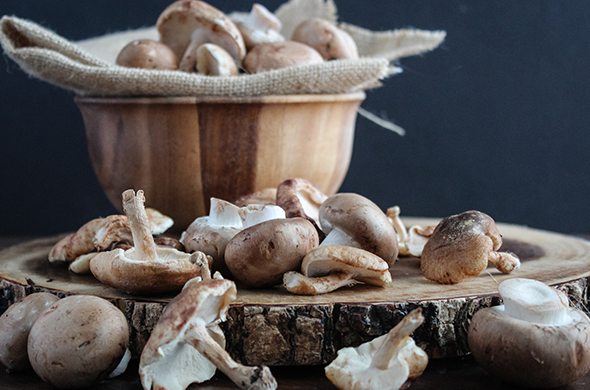Mushrooms embody the energy of foraging through the forest, dirt scattered across your palms, a basket full of your findings. It’s in the realm of fungi that we discover how much food connects us back to the earth, with mushrooms rooting us to our ancestors.
History
Mushrooms date back to ancient times, with archaeological evidence of edible mushrooms found in Chile dating back to 13,000 years ago. From cooking to medicine, mushrooms were mainly used by the upper class. Roman emperors had many food tasters to ensure that the mushrooms served were safe to eat. Mushroom hunting was one of the most dangerous tasks since the beginning of time, with over 80 poisonous species documented today, there was a very likely chance of coming across one of them while foraging causing poisoning and death. Yet it was the mushrooms beauty, flavor, and texture that continued to lure people into discovering thousands of more species.

Health Benefits
- Cholesterol-free
- Sodium-free
- Low-calorie
- Gluten-free
- Fat-free
Even though mushrooms tend to have a lack of color, they carry as many nutrients as bright-colored fruits and vegetables. They are an excellent source of the B vitamins riboflavin, niacin, and pantothenic acid, which have a direct impact on energy levels, brain function, and cell metabolism. Mushrooms are the only non-fortified source of vitamin D as they are produced in sunlight.
For those experiencing issues with maintaining a healthy weight, consuming mushrooms may help with weight management due to having few calories and being low in fat. Research suggests that increasing low energy dense food in your diet, such as mushrooms, allows one to feel full and satisfied for a longer period of time. It is encouraged that Americans consume foods low in saturated fat and sodium and mushroom’s inherent umami counterbalances saltiness and allows for less salt to be used in recipes.
Mushrooms work closely with your immune system because they are an excellent source of the antioxidant, selenium, which strengthens the immune system and protects body cells from damage. Rich in potassium, they are important for the function of your heart, muscles, and nerves. They are the highest source of ergothioneine and glutathione, which decrease inflammation. In a recent study, Lion’s Mane, an edible and medicinal mushroom native to North America, Europe, and Asia has been used to treat neurological disorders such as multiple sclerosis, rheumatoid arthritis, and systemic lupus erythematosus.
Nutrition per 1 cup serving:
- Calories: 15
- Fat: 0.2g
- Cholesterol: 0mg
- Carbohydrates: 2.3g
- Fiber: 0.7g
- Protein: 2.2g
- Vitamin C: 3%
- Iron: 11%.
Superheroes
One major reason why mushrooms are considered a superfood is their ability to eradicate viruses including flu and smallpox, bacteria such as salmonella and E. Coli, and yeast. They carry cancer-fighting powers because they have the protein lectin, which binds to abnormal or cancer cells and labeled for destruction by the immune system. Research suggests that introducing mushrooms to the diet may help fight against breast cancer, hepatocellular cancer, uterine cervix cancer, gastric cancer, and acute leukemia.
How To Use
While it is safe to consume mushrooms in their raw state, cooking helps to release their nutrients. Mushrooms can be prepared in many different ways, including broiled, sautéed, deep-fried, and baked. We recommend Chef Rocky Maselli’s recipe for Farro Pasta and our paleo spinach, mushroom and farmer cheese crepes.
To recreate this dish, be sure to check out our store locator for our Plain Organic Whole Milk Kefir and Farmer Cheese.